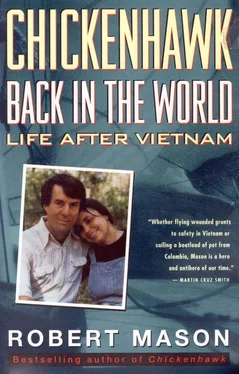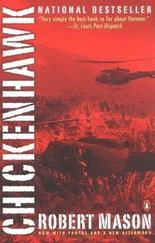Robert Mason - Chickenhawk - Back in the World - Life After Vietnam
Здесь есть возможность читать онлайн «Robert Mason - Chickenhawk - Back in the World - Life After Vietnam» весь текст электронной книги совершенно бесплатно (целиком полную версию без сокращений). В некоторых случаях можно слушать аудио, скачать через торрент в формате fb2 и присутствует краткое содержание. Год выпуска: 2013, Издательство: BookBaby, Жанр: Старинная литература, на английском языке. Описание произведения, (предисловие) а так же отзывы посетителей доступны на портале библиотеки ЛибКат.
- Название:Chickenhawk: Back in the World - Life After Vietnam
- Автор:
- Издательство:BookBaby
- Жанр:
- Год:2013
- ISBN:нет данных
- Рейтинг книги:3 / 5. Голосов: 1
-
Избранное:Добавить в избранное
- Отзывы:
-
Ваша оценка:
- 60
- 1
- 2
- 3
- 4
- 5
Chickenhawk: Back in the World - Life After Vietnam: краткое содержание, описание и аннотация
Предлагаем к чтению аннотацию, описание, краткое содержание или предисловие (зависит от того, что написал сам автор книги «Chickenhawk: Back in the World - Life After Vietnam»). Если вы не нашли необходимую информацию о книге — напишите в комментариях, мы постараемся отыскать её.
Chickenhawk: Back in the World - Life After Vietnam — читать онлайн бесплатно полную книгу (весь текст) целиком
Ниже представлен текст книги, разбитый по страницам. Система сохранения места последней прочитанной страницы, позволяет с удобством читать онлайн бесплатно книгу «Chickenhawk: Back in the World - Life After Vietnam», без необходимости каждый раз заново искать на чём Вы остановились. Поставьте закладку, и сможете в любой момент перейти на страницу, на которой закончили чтение.
Интервал:
Закладка:
While I put our evening meal together, I designed a real smuggling sailboat. It had a fifteen-hundred-horsepower turbine engine—like the one in the Huey I used to fly—mounted below deck. My boat had hydrofoils under the hull and a deck-mounted 20mm cannon. When things looked grim, we’d drop sails on my boat, give ‘em a few blasts with the cannon for fun, ka-pow! and then we’d kick in the turbine and blast away on the hydrofoils at sixty knots. Fuck you, pirates. Fuck you, Coast Guard.
When we sighted land at sunset on the fifth day, we changed course slightly to keep our distance. Our new concern was the Colombian navy.
We sailed parallel to the west coast of the Guaijira Peninsula, scanning the coast, looking for landmarks with the binoculars. Using landmarks, like a big power plant and a mountain peak we could see on shore and locate on the map, we could triangulate our position.
John began calling our contact. “Ike. Ike. This is Tina. This is Tina. Over,” he said. He repeated the message for five minutes. We heard nothing but static.
Two hours later, we saw lights popping to life on the coast as darkness set in. We usually ate about now, but no one was cooking. We passed the binoculars around, looking for trouble in all directions.
John tried the radio again. “Ike. Ike. This is Tina. This is Tina. Over.”
“Hello, Tina. This is Ike.”
“Son of a bitch!” John said to Ireland and me. “He’s there!”
“Glad to hear you,” John said. “We’re about fifteen miles from rendezvous. Over.”
“Roger, Tina. We’re ready. Let me know when you’re within a mile or so. I’ll put the lights on.”
“Roger, Ike. What about the yacht club?” John radioed. I didn’t know what that meant.
Ike laughed on the radio. “Don’t worry about the yacht club, Tina. The regatta’s over.”
“Roger, Ike. See you in about three. Tina out.” John put the microphone down, smiling.
“What’s the yacht club? Put what lights on?” I said.
“The ‘yacht club’ means the Colombian navy. They’re not around. And Ike’s got a Land Rover on the beach. He’ll park it facing the water. When we’re closer, he’ll turn the lights on.”
“Who’s this guy, Ike?” I asked. Ireland had gone below.
“He’s another Nam vet,” John said. “Seem to be a lot of us in this business. Guess we have the proper training.”
“Maybe,” I said. “I still think most of this mission is based on fucking blind luck.”
“You call this luck? We hit our target on the dot. We’re right on time. Luck? The damn navy is nowhere to be seen. You call that luck?” John shook his head like a guy trying to talk sense to an idiot. “Bob,” John said quietly, “we’ve done this before.”
He was right. I was arguing from ignorance. “You took care of the navy?”
“Ike did. That’s part of his job.”
“How’d he do that? How do you take care of a whole navy?”
“You’ll be meeting him in a few hours. Why don’t you ask him yourself?”
Ireland came up from below with a pot of coffee. We made peanut butter and Ritz cracker sandwiches and ate while we kept a nervous vigil. Ike said he’d taken care of the navy, but people boast.
CHAPTER 17
“Ike, this is Tina. Over,” John radioed. According to our plots on the map, we should have been close to the pickup point.
“Hear you, Tina. Do you see me?”
We looked along the dark coast and saw car headlights blaze out through the humid air. It looked like we were about a mile away.
“Roger, Ike. I see you. We’ll move in closer.”
“Okay, Tina. Just watch your depth; gets shallow quick around here.”
We’d already dropped the sails and were motoring. Our wake was alive with glittering phosphorescent sea life emitting an eerie green light a hundred times brighter than we’d seen before. The water around the Namaste looked like it was lit by underwater lamps in the hull. The bright green prop wash extended back hundreds of yards. As John stood in the cockpit steering the Namaste , I watched the depth finder and Ireland stood out on the bow pulpit checking for obstacles—rocks, logs, canoes. It was a moonless night, but you could see well enough in the starlight to spot large objects if they got close enough.
“Fifty feet,” I said.
“Okay. Tell me when it gets to fifteen.” The Namaste had a six-foot draft.
John steered parallel to the shore until he came abreast of the car lights. He turned toward shore and throttled down to a crawl.
“Looking good,” Ike radioed.
Apparently Ike could see us, but we could only see his headlights. When we got closer, I could see flashlights bobbing around the car. The depth finder showed the water getting shallow fast. “Fifteen feet.” John put the engine in neutral. We drifted closer.
About two hundred yards offshore, I called out, “Ten feet, closing on eight real fast.” John shut down the engine and yelled to Ireland to drop anchor. The anchor hit the water with a green explosion, making an effervescent, iridescent green path to the bottom like a stream of glowing champagne. I went forward with some tools. Ireland and I undid the safety line on the starboard side so it wouldn’t get in the way when we loaded the bales.
The Namaste tugged against the anchor line and gradually aligned herself with the slow current. We saw the phosphorescent wake of a canoe heading out to us. On the beach we saw flashlights jerking around while the Indians got the load together.
We stood on deck and watched the canoe approach. A dark shape against the eerie glow of the water, it looked like it was floating in space. When the canoe came alongside, we could see that it was a huge dugout, twenty-five feet long and about five feet wide, carved from a mahogany tree. Indians chattered and laughed. The dugout was piled with bales of marijuana. When they reached out and grabbed the Namaste , a man jumped on board.
“Hey, John. Long way from home, eh?” the man said.
“Hi, Pete. Good to see you, man!” Ike’s name was Pete. John and Pete shook hands.
Pete turned around, called four of the Indians aboard—his cargo crew—and told them in Spanish to start unloading. The four Indians in the canoe tossed bales on deck. We all helped, grabbing the bales as they tossed them aboard. I grabbed one. Weighed about forty or fifty pounds, was cube-shaped, about eighteen inches on a side, wrapped in burlap. The bales varied in size, ranging from thirty pounds to sixty pounds. Pete called out the weights as they came aboard and John wrote them down, keeping a tally of what we loaded. I wrestled a bale to the forward hatch and dumped it below. I saw a dark man smiling up at me. He said, “ Bonita , no? Beautiful, huh?” I smiled and said yes. In the lights below deck I could see the bales had boldly printed on the sides: product of Colombia.
In ten minutes the first canoe was unloaded and on its way back to shore for more. We could see another canoe drifting toward us on a phosphorescent cloud. I went back to the cockpit. John and Pete were sitting on the lawn chairs talking. “Product of Colombia?” I said. “They print that up for the pot?”
“Naw,” Pete said, laughing. “They make the wrappings out of coffee-bean sacks.”
“Pete,” John said, “this is Bob, a friend of mine. He’s a Nam vet, too.”
Pete sat in the shadows under the dodger and it was hard to make him out. I saw he was clean-shaven, wore casual tourist-style clothes—short-sleeved shirt, jeans—but I couldn’t make out his features well enough to describe.
As the second canoe approached, we heard the paddlers singing a native song. “Happy bunch,” I said.
Читать дальшеИнтервал:
Закладка:
Похожие книги на «Chickenhawk: Back in the World - Life After Vietnam»
Представляем Вашему вниманию похожие книги на «Chickenhawk: Back in the World - Life After Vietnam» списком для выбора. Мы отобрали схожую по названию и смыслу литературу в надежде предоставить читателям больше вариантов отыскать новые, интересные, ещё непрочитанные произведения.
Обсуждение, отзывы о книге «Chickenhawk: Back in the World - Life After Vietnam» и просто собственные мнения читателей. Оставьте ваши комментарии, напишите, что Вы думаете о произведении, его смысле или главных героях. Укажите что конкретно понравилось, а что нет, и почему Вы так считаете.












